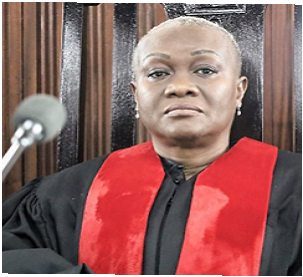By Grace Q. Bryant
The Supreme Court has denied the petition filed by the Collaborating Political Parties (CPP) against National Election Commission in which they demanded the unconstitutionality of the NEC to demarcate constituencies after the conduct of the National population census.
Reading the opinion yesterday on behalf of the Supreme Court, Chief Justice Yuoh said, it is a precedent in this jurisdiction that in an “in re” proceeding, an adverse party is not formally designated or named, and if this is done, as in the instant case, same constitutes harmless error.
CPP filed a petition to the Supreme Court based on the unconstitutionality of the respondent NEC who is currently conducting Voter registration without demarcating various electoral constituencies after the conduct of the controversial census.
“That in our jurisdiction, where a case does not commence at the National Elections Commission and the party adversely affected by a decision therefrom appeals to the Supreme Court, said case does not constitute an election matter within the contemplation of the constitutional mandate that the Supreme Court hears and makes a determination on an election matter within seven (7) days,” Chief Justice Yuoh said .
“Hence, the mere fact that political parties, an
alliance, a candidate or the NEC are mentioned or challenged in a case does not facto make same an election matter,” the high court emphasized.
According the Chief Justice, the Constitution must be interpreted in light of the entire document rather than a sequestered pronouncement, that every provision is of equal importance and even where there is apparent discrepancy between different provisions, the Supreme Court should harmonize them if possible. In the instant case, Article 80(d)(e) are linked and inter- dependent on the other.
Article 80(d) states, “Each constituency shall have an approximately equal population of 20,000, or such number of citizens as the Legislature shall prescribe in keeping with population growth and movements as revealed by a national census; provided that the total number of electoral constituencies in the Republic shall not exceed one hundred.
And (e), “Immediately following a national census and before the next elections, the Elections Commission shall reapportion the constituencies in accordance with the new population figures so that every constituency shall have as closed to the same population as possible; provided, however, that a constituency must be solely within a county.
The high court added That while the NEC has a duty under Article 80(e) to reapportion constituencies, the said duty is not self-executing; the duty to reapportion constituencies can only be executed based upon the preconditions that a National Census Report be concluded and submitted to the Legislature; that the Legislature creates the threshold; and then the NEC performs its duty to reapportion the constituencies pursuant to Article 80(e).
“Wherefore AND IN VIEW OF THE FOREGOING, the “in re” proceeding issue and we find no reason to disturb the ongoing voters’ registration exercise Since the NEC is not in violation of the Constitution as regards Article 80(d)(e). The Clerk of
nis Court is ordered to inform the parties accordingly,” the court ruled.

